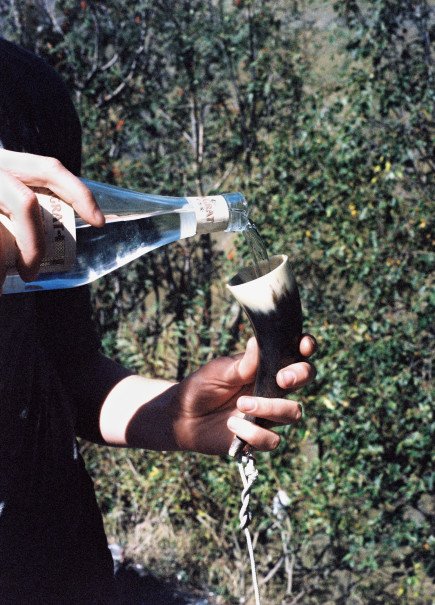
A Traveler’s Toast to Dead, Drunk Men

A Traveler’s Toast to Dead, Drunk Men
Chacha in Georgia
The tombstone near the top of Albano Pass was the most elaborate so far. Further down the mountain they were just metal plaques strung on posts between the mile markers. Shepherds, probably, who had fallen off the road’s sheer edge while guiding their herds from Tusheti, the mountain region we were headed to, down to Kakheti, the lowland wine region we’d come from.
Twenty miles and over two hours in, we were just half way. The highest pass in the Northern Caucasus range was almost 10 miles ahead of us, the town of Omalo 20 miles beyond that—almost at the Russian border—the valley floor dizzingly far below. Uri was calm in the driver’s seat, easing the car around hairpin turns; Christine was chatty. But Yuval and I clutched our hearts every time Uri threw the Jeep in reverse to let another car pass. The road was barely 12 feet wide, and clung hoveringly to the mountain as though static electricity held it there. Herds of cows swarmed our car at the narrowest passes.
We stopped to rest at the stately tombstone on its windy ridge. It was sheer black marble and embossed with the silvery likenesses of four men: youngish, paunchy cheeks, thick eyebrows, vaguely haloed. At the base of their tombstone was the fender of a car and a bottle of chacha.
A clear alcohol made from the grape skins and stems leftover from winemaking, chacha is the Republic of Georgia’s version of grappa, a Georgian moonshine that burns in the sinuses and doesn’t easily loosen its grip the morning after. Before we even set out on this road, supposedly one of the most dangerous in Georgia, we heard about this tombstone. The men apparently died driving off the road, drunk. Tied to one of posts of their gravestone is a khantsi, a drinking horn, central to Georgia’s culture of ritual toasting. By tradition a toastmaster, the tamada, announces the topic for each round, and the assembled drink up, the whole horn at once.
Travelers are meant to toast here, too; to the dead, drunk men or to their own safe passage, we weren’t sure. We didn’t take the chance. On the way up Uri and Yuval—an Israeli couple in a rented Jeep with whom we’d hitched a ride just that morning—had told us it was Yom Kippur, the Day of Atonement. In Jewish tradition, it is the day God writes every living being’s name in the Book of the Living or the Book of the Dead.
We left the grave and trundled on for hours instead—our stomachs jilted and empty, the gas tank dwindling—to Omalo, a town of about 50 Georgians with a nearly equal number of Israeli travelers. We toasted chacha to the road from the safety of our guesthouse, while Uri and Yuval told us about life in Israel, about state-issued gas masks, climbing onto rooftops to watch missiles explode like fireworks during the Gulf War. The town below us was silent in late October, nearly the end of the season for tourist and local alike. The road would close by November, impassable in the snow.